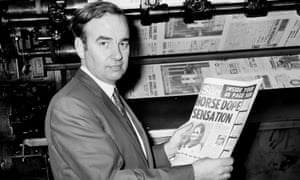
The birth of the Sun newspaper, and the enduring impact of Rupert Murdoch’s sexed-up approach to journalism, is to be explored as part of the new season at London’s Almeida theatre. INK, by James Graham, whose show This House recently opened in the West End after a hit run at the National, will look at British newspapers in the 1960s and how Murdoch established a new kind of sensationalist tabloid journalism.
Rupert Goold, the Almeida’s artistic director, who will direct the production, described it as a comedy that was “very anarchic and very nostalgic about the lost traditions of Fleet Street”.
It was, he said, an exploration both of the voice of populism – particularly the voice Murdoch’s newspaper was seen to give to marginalised, disenfranchised and largely working class people – and of the way the “media, in different forms, prioritises stories and narratives over the facts and the truth”. Goold said the activities of the young Murdoch provided a wealth of dramatic material for Graham to work with, describing it as a “great role, very funny”.
With debate continuing about whether the second part of the Leveson inquiry will proceed, the play will be particularly timely.

This year will also see the Almeida embark on its largest ever digital project, expanding beyond the physical stage to explore the scepticism towards political charisma and oration that has recently gripped the world.
Figures of Speech will see some of the most respected names in theatre and politics perform famous speeches, from Mao Zedong and the British suffragettes to the former Labour leader Ed Miliband and US president Richard Nixon. They will be filmed over the course of the year, with each performer kept as a surprise, and then uploaded to a dedicated microsite and the Guardian website.
The first film will see Vanessa Redgrave reading Vaclav Havel’s “Words on Words”, which examines the relationship between language and peace, and is being released to coincide with Donald Trump’s presidential inauguration.
For Goold, occupying the digital realm as well as the theatre space was just another way to examine performance in the modern world, and felt like an interesting way to take on the world’s “scepticism towards communication and communicators”.
“When Brexit blew up last summer it felt like there was incredible scepticism towards personal charisma,” he said. “We ended up with May and Corbyn – and whatever you think of their politics, they are not natural orators – and in America they chose to replace Obama with Trump’s vulgarity. But I still believe that impassioned oratory is a powerful force for change, irrespective of your politics, so I thought: ‘What is our responsibility here? What do we offer to the discussion?’”
Just as film and television had adapted to changing technology and viewing habits, Goold said he felt the Almeida should be doing the same with live theatre. The theatre hoped to do one film a week for a year, with choices often being made in response to the news or anniversaries. “The project may even grow beyond the Almeida and become __more international as it develops,” he said.
August will also see the debut of Pulitzer-nominated playwright Christopher Shinn’s new work, Against. Ben Whishaw will play Luke, a tech millionaire convinced he is the next messiah, whose calling is to confront violence in America.
Shinn’s starting point for the play was asking what would happen if a Jesus-like figure arrived in contemporary America, and how he would preach his message. “Luke is this YouTube Jesus figure,” said Goold. “The play is very soulful, and again, in the current American climate, will be quite timely. We associate faith in America with the Republicans and the right, but this looks at faith as a __more egalitarian, almost socialist, principle.”
A revival of Martin Crimp’s black comedy The Treatment will also be part of the season and, in a nod to the Almeida’s experimental past, the performer and lip-synch artist Dickie Beau will haunt the set of its Hamlet production to perform his own take on “the Dane”, bringing in audio recordings, drag and dance.
“Back in the 80s, the Almeida had quite avant-garde roots, and we felt it was important to still to put more unusual and experimental stuff on the stage as well,” Goold said.